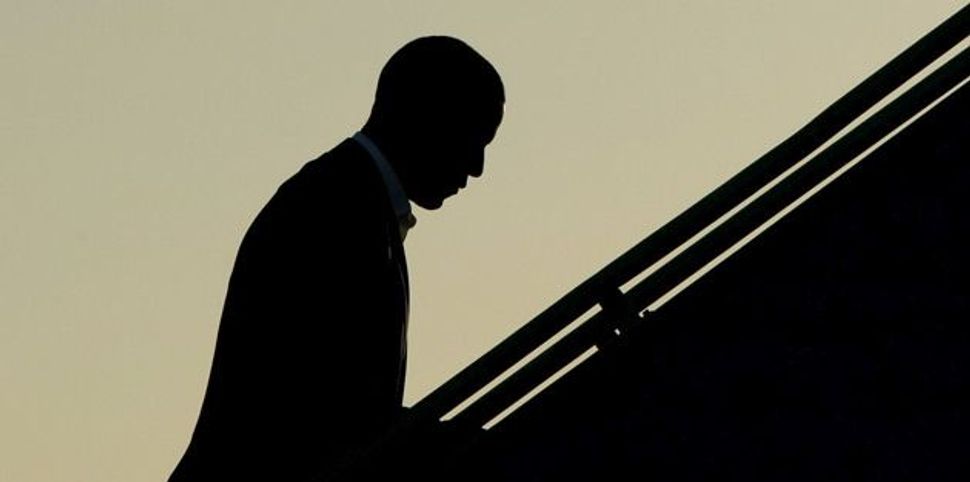Seeking the Power Of a Community Organizer

Obama Image by GETTY IMAGES
Back during Barack Obama’s campaign for the presidency, I frequently found myself arguing with friends who were supporting Hillary Clinton’s bid. “How,” they would ask, “do you expect this young and relatively inexperienced man to stand up to the walruses of the Congress? They will ride roughshod over him!”
My answer, which seemed to me (but not to them) compelling, was that I did not expect Obama to be able to stand up to Congress. What I did expect was that he would use his skills as a community organizer to mobilize “the people” and have them press their representatives in Congress. I did worry a bit about whether you could successfully keep the people mobilized over the long haul, but in light of Obama’s evident success as a populist campaigner, that was a second-order worry. I believed that “Yes we can!” would carry the day — and the years of the Obama presidency.
I was wrong, and I was right. I did not then know the other part of Obama, the deeply thoughtful and sober leader, a man of few public words and much quiet reflection. Nor did I, and I believe this is more important, calculate the importance of Obama’s senior advisers in the process. Whatever their virtues, neither Larry Summers nor Timothy Geithner have even a smidgen of populist streak. Neither, so far as I can tell, does Rahm Emanuel nor David Axelrod. These and others have, it seems to me, acted to inhibit the president’s skills at community organization.
The result? The best example is the dismal debate on health care, an arduous episode of misconnection and disconnection, of non-sequiturs, lies, a national debate in which all the mobilization was by the other side. “Yes we can!” devolved into…silence. With periodic exceptions, none of them part of a sustained effort, the president seemed hors de combat, out of action. And the explanations — preoccupation with a broken economy, preoccupation with Afghanistan, preoccupation with a baker’s dozen of very real issues, even crises — were simply insufficient.
These last few weeks, the candidate has finally re-emerged. It’s not possible to capture on paper the electricity of Obama the candidate, but if you can close your eyes while you read (I know, I know) this brief excerpt from his speech at the University of Wisconsin on September 28, remembering the rhythms and the sureness — well, here it is: “The fact is that we’re not where we need to be — not even close. The hole that we’re climbing out of is a deep one…. So I understand that people are frustrated. I understand people are impatient with the pace of change. Of course they are. Look, I’m impatient, but I also know this: Now is not the time to lose heart. Now is not the time to give up. We do not quit. And we cannot forget that this nation has been through far worse and we have come out stronger from war to Depression to the great struggle for equal rights and civil rights. We do not quit.”
He continued: “In every instance, progress took time. In every instance, progress took sacrifice. Progress took faith. You know, the slaves sitting around a fire singing freedom songs, they weren’t sure when slavery would end but they understood it was going to end. When women were out there marching for the right to vote, they weren’t sure when it was going to happen but they kept on going. When workers were organizing for the right to organize and were being intimidated, they weren’t sure when change was going to come but they knew it was going to come. And I am telling you, Wisconsin, we are bringing about change and progress is going to come — but you’ve got to stick with me. You can’t lose heart.”
I recognize that that kind of rhetoric is not what governing’s about — not entirely. But neither is it a device to be stashed away during the many months between elections. It is, or can be, an important tool of leadership. The voice of the candidate, of this once and future candidate, is simply too valuable a resource to be put into deep storage.
The Republicans have been hugely successful in transforming the November elections into a referendum on Obama, even though his name will not be on any ballot. Obama’s approval ratings are low. And it is late in the day, perhaps too late. But maybe, just maybe, I was right, back during the last campaign, to think that a community organizer could trump the special interests and the broken institutions that currently so ill serve the American people.
A message from our CEO & publisher Rachel Fishman Feddersen

I hope you appreciated this article. Before you go, I’d like to ask you to please support the Forward’s award-winning, nonprofit journalism during this critical time.
At a time when other newsrooms are closing or cutting back, the Forward has removed its paywall and invested additional resources to report on the ground from Israel and around the U.S. on the impact of the war, rising antisemitism and polarized discourse.
Readers like you make it all possible. Support our work by becoming a Forward Member and connect with our journalism and your community.
— Rachel Fishman Feddersen, Publisher and CEO






















